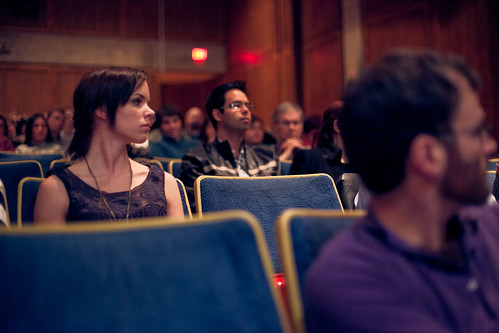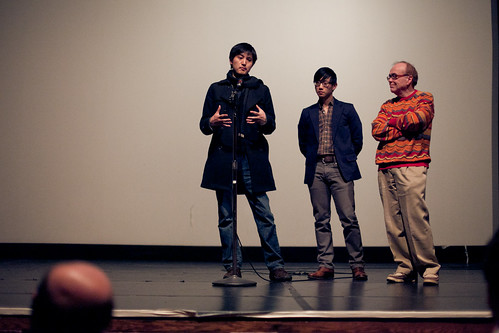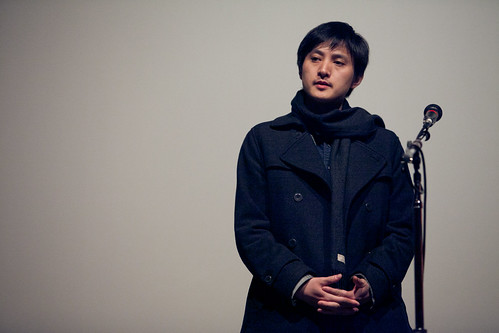breathtaking (and heartwrenching) cinemascope
7.3.10Thursday night consisted of a night at the cinema, preceded of course by dinner at Padmanadi (which my chum Leanne described to me as the tasty fake meat place). How I had never been to this particular restaurant in the three and a half years I have been living here I am not sure. Based on the deliciousness of the dishes that we ordered I am sure to return.
While I can't claim to have discovered Padmanadi (since I knew of its existence just never went), it was truly a delightful experience eating there. Although there are plenty of unique dining locations in Edmonton, for some reason I always associate chain restaurants with this city. It's not as if I even frequent those chains, most of my dining out takes places at independent eateries, but I can't seem to shake the feeling that I'm in another city when I visit some of these restaurants where the decor is not boxy and the art on the walls are not the same as restaurants across the country. I suppose this is because I associate a lot of Edmonton with big box development. The smaller, independent restaurants do exist, but you have to seek them out, sometimes with the assistance of more knowledgeable friends. When you discover them, they reveal an entirely new side of the city, reminiscent of places in other metropolitan destinations.
When I first moved to Edmonton, with the exception of my chum-of-all-chums Wade and my then 'romantic' partner (and their respective social circles), I didn't have very many friends who were solely mine. By that time I had been on flickr for a couple years and had established a few tenuous connections with people in other cities that had resulted in a couple interesting face-to-face meets (with cameras in hand). I can't remember exactly who found who on flickr, but soon after moving to the city, I became flickr contacts with a fellow named Ted Kerr. Ted and I never met in person until 2008 when he was a presenter at the first Pecha Kucha and we've had sort of intermittent contact online. Ted had been working with the Global Visions Film Festival, particularly in helping to promote documentaries that are part of the Doc Soup series. Over the past couple months he has been really great about letting me know about all of the upcoming screenings. Unfortunately, I haven't been able to attend the last couple two screenings, but I was able to go to the most recent showing of Last Train Home and take pictures of the director during the question and answer period.
Doc Soup has been playing Ziedler Hall in the Citadel Theatre. Ziedler Hall is also the home of Metro Cinema, which screens classic and arthouse films as well as films from local filmmakers. This week includes a sampling from Truffaut, Taxi Driver, and some fare from NFB. If you were to substitute theatres for cinema, Ziedler Hall/Metro/Doc Soup is also one of those somewhat hidden gems of the city. However, as far as gems so, Ziedler Hall is one that has lost some of its lustre (although that is part of its charm). The screen and curtains could use a refresher, and the seats, although a spectacular vision of primary colours, could be replaced with something a touch more comfortable and less squeaky. I've heard that the hall is being renovated this summer and my only hope is that they try to retain as much of the original character of the theatre as possible.
After dinner, Leanne and I met up with Alessandra and Tom and selected our prime seats inside. I continue to enjoy the benefits of owning a camera with remarkable ISO capabilities and shoot without flash even in dark venues. I marvel that the majority of the shots inside the theatre were taken at ISO 6400. My 30D was only capable of ISO 1600.
I cannot hide the fact that I am easily brought to tears while watching movies. Most of my sisters are the same, so I feel no shame in admitting my overactive tear ducts. I had a feeling that this documentary would no doubt reduce me to tears, but I did not come prepared with tissues or handkerchief. We kept things as light and airy as possible before the film, with little sissy posing with her popcorn and a look of cinematic surprise.

Last Train Home is the debut documentary from Chinese-Canadian director, Lixin Fan. Lixin was an associate producer on the film Up the Yangtze, which I saw a few years ago at the Paramount as part of the Global Visions Film Festival (note: the Paramount is now used as a church). Up the Yangtze chronicles the story of a population displaced by the construction of the Three Gorges Dam.
Last Train Home followed a similar theme of displacement, this film telling the story of migrant workers.
Every spring, China’s cities are plunged into chaos, as all at once, a tidal wave of humanity attempts to return home by train. It is the Chinese New Year. The wave is made up of millions of migrant factory workers. The homes they seek are the rural villages and families they left behind to seek work in the booming coastal cities. It is an epic spectacle that tells us much about China, a country discarding traditional ways as it hurtles towards modernity and global economic dominance.
Last Train Home, an emotionally engaging and visually beautiful debut film from Chinese-Canadian director Lixin Fan, draws us into the fractured lives of a single migrant family caught up in this desperate annual migration. Sixteen years ago, the Zhangs abandoned their young children to find work in the city, consoled by the hope that their wages would lift their children into a better life. But in a bitter irony, the Zhangs’ hopes for the future are undone by their very absence. Qin, the child they left behind, has grown into adolescence crippled by a sense of abandonment. In an act of teenage rebellion, she drops out of school. She too will become a migrant worker. The decision is a heartbreaking blow for the parents. In classic cinema verité style, Last Train Home follows the Zhangs’ attempts to change their daughter’s course and repair their ruptured family. Intimate and candid, the film paints a human portrait of the dramatic changes sweeping China. We identify with the Zhangs as they navigate through the stark and difficult choices of a society caught between old ways and new realities. Can they get ahead and still undo some of the damage that has been done to their family?
After the screening Lixin answered questions about his film from the audience. He gave some updates about the family featured in the film and spoke about some of the criticisms that the film has received by the Chinese press. Lixin referenced one article headline that essentially read, "why would you want to make films of sad things?"
I wouldn't say that the film is harshly critical of the difficult situation of the migrant worker in China. Compared to other heavy-handed documentaries I've seen in the past, Last Train Home provided insight to the huge cultural and economic shifts that China is experiencing without passing judgment or filtering the story through some intense bias. At the end of the night Lixin reiterated a statement he had made earlier in an article in the National Post,
"I want to help to build the bridge between China and the rest of the world. There are a lot of misunderstandings and differences in culture and economics and politics. There has to be a dialogue, and I think the medium of documentary cinema is a perfect way for both sides to get to understand each other."
I count myself lucky to have such a diverse ethnic background. So far I've been lucky to visit Italy and Trinidad, but I have yet to visit China. My Chinese side is perhaps my most mysterious, having never met my grandfather and also growing up in northern BC where Chinese culture is not particularly vibrant. But it's a side that I'm hoping to learn more about. Whether or not that means I actually visit China has yet to be determined.








0 comments